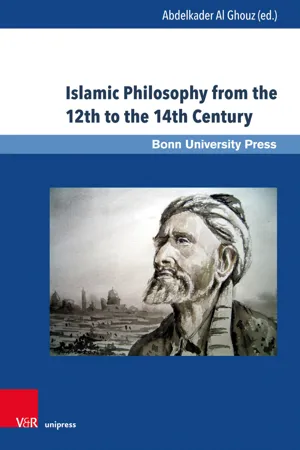
- 505 pages
- English
- PDF
- Available on iOS & Android
Islamic Philosophy from the 12th to the 14th Century
About this book
This volume is based on the ongoing studies on post-Avicennian philosophy in the context of naturalising philosophy and science in Islam from the 12th to the 14th century – a topic that deserves the special attention of historians of Islamic intellectual history. The contributors address the following questions using case studies: What was philosophy all about from the 12th to the 14th century? And how did Muslim scholars react to it during the period under consideration? The present volume approaches complex philosophical topics from different angles and is structured around six main sections: 1. Historical and Social Approaches to Philosophy, 2. Knowing the Unknown, 3. God, Man and the Physical World, 4. Universals, 5. Logic and Intellect, and 6. Anthropomorphism and Incorporealism.
Tools to learn more effectively

Saving Books

Keyword Search

Annotating Text

Listen to it instead
Information
Table of contents
- Title Page
- Copyright
- Table of Contents
- Body
- Abdelkader Al Ghouz: Introduction
- Historical and Social Approaches to Philosophy
- Dimitri Gutas: Avicenna and After: The Development of Paraphilosophy. A History of Science Approach
- Maribel Fierro: Ibn Rushd's (Averroes) ˋDisgrace' and his Relation with the Almohads
- Knowing the Unknown
- Yahya M. Michot: Ibn Taymiyya’s Commentary on Avicenna’s Ishārāt, namaṭ X
- Luis Xavier López-Farjeat: Post Avicennian Philosophy in the Muslim West: Ibn Bājja, Ibn Rushd and Ibn Khaldūn on Veridical Dreams and Prophecy
- God, Man and the Physical World
- Andreas Lammer: Two Sixth/Twelfth-Century Hardliners on Creation and Divine Eternity: al-ahrastānī and Abū l-Barakāt al-Baġdādī on God’s Priority over the World
- Davlat Dadikhuda: Not That Simple: Avicenna, Rāzī, and Ṭūsī on the Incorruptibility of the Human Soul at Ishārāt VII.6
- Peter Adamson: Fakhr al-Dīn al-Rāzī on Void
- Universals
- Fedor Benevich: The Metaphysics of Muḥammad b. ʿAbd al-Karīm al-ahrastānī (d. 1153): Aḥwāl and Universals
- Yuki Nakanishi: Post-Avicennian Controversy over the Problem of Universals: Saʿdaddīn at-Taftāzānī (d. 1389/90) and amsaddīn al-Fanārī (d. 1431) on the Reality of Existence
- Logic and Intellect
- Hanif Amin Beidokhti: Suhrawardī on Division of Aristotelian Categories
- Nariman Aavani: Afḍal al-Dīn Kāshānī on the Unification of the Intellect, Intellector, and Intelligible
- Anthropomorphism and Incorporealism
- Livnat Holtzman: The Bedouin Who Asked Questions: The Later Ḥanbalites and the Revival of the Myth of Abū Razīn al-ʿUqaylī
- Jon Hoover: Ibn Taymiyya’s Use of Ibn Rushd to Refute the Incorporealism of Fakhr al-Dīn al-Rāzī
- Authors
- List of Illustrations, Tables and Diagrams
- Index
Frequently asked questions
- Essential is ideal for learners and professionals who enjoy exploring a wide range of subjects. Access the Essential Library with 800,000+ trusted titles and best-sellers across business, personal growth, and the humanities. Includes unlimited reading time and Standard Read Aloud voice.
- Complete: Perfect for advanced learners and researchers needing full, unrestricted access. Unlock 1.4M+ books across hundreds of subjects, including academic and specialized titles. The Complete Plan also includes advanced features like Premium Read Aloud and Research Assistant.
Please note we cannot support devices running on iOS 13 and Android 7 or earlier. Learn more about using the app